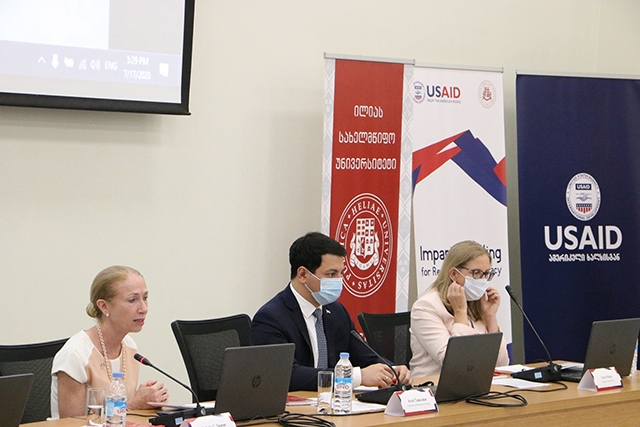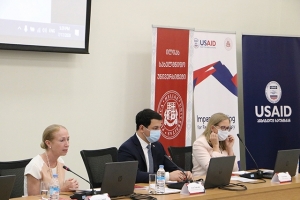USAID, Ilia State University Launch Public Opinion Polling Forum
On July 17, as a result of cooperation between USAID/Georgia and Ilia State University, a forum ‘Impartial Polling for Developing Citizen-Responsive Democratic Governance in Georgia’ was held in Tbilisi.
The online event was aimed at raising awareness of non-partisan public opinion polling as a key component of Georgia’s democratic development.
The public opinion polling discussion series will be held regularly and will last until September 2020.
Bringing together five distinguished Georgian polling organizations: the Analysis and Consulting Team (ACT), Caucasus Research Resource Centers (CRRC), Georgian Opinion Research Business International (GORBI), Institute of Social Studies and Analysis (ISSA), and IPM Research, the multi-week forum will build the capacity of Georgian polling organizations, establish a code of conduct to guide public opinion research, and raise awareness among the media, academic community, and political stakeholders about polling.
The launch event featured remarks from US Ambassador to Georgia Kelly Degnan, UK Deputy Head of Mission Claire Allbless, Speaker of the Parliament of Georgia Archil Talakvadze, and Ilia State University Rector Giga Zedania.
In her opening remarks, Ambassador Degnan stressed the importance of independent, non-partisan public opinion polling for ensuring that political processes respond to the needs of citizens.
“I am very pleased to be here today for the first session of the public opinion Polling Forum, a partnership between Ilia State University and USAID,” the Ambassador said. “The forum is designed to build the capacity of non-partisan polling organizations to establish a code of conduct that will guide their work, and to help Georgian citizens better understand the important role that non-partisan polling plays in helping their views be heard. The United States government views non-partisan independent polling as a critical part of building a democracy that better represents citizens’ priorities. And this is because polling is a way to get citizens views heard and it is a critical link to the communication between political leaders and the citizens that they are to represent.”
After the event, Parliament Speaker Archil Talakvadze emphasized the importance of public opinion polling in terms of the country’s democratic development and expressed strong support to conducting such surveys on behalf of the Georgian Parliament.
“Today, a very exciting conference took place with the support of the US government, where a discussion was held about relevant topics, among them public opinion polling and its importance, the impartiality of surveys, standards, methodology used when conducting surveys in the process of economic development of the country, and more. I believe that this discussion, in the end, will significantly contribute to introducing certain standards in our country which are necessary for conducting objective and impartial surveys. At this forum, we saw common support toward public opinion polling, and on behalf of the Georgian Parliament, I also want to express strong support to such surveys and emphasize their importance,” he said, going on to underline that the important of the poll has been further increased in the election year.
“For us, politicians, media and civil society, a public opinion poll is an instrument crucial to understanding the tendencies in society, as it can provide important knowledge about public behavior, positions, aspirations, attitude and values. It is particularly important in the election year since an opinion poll may allow us to better plan the campaign, to be informed about the support of certain changes to the law, how the character of a candidate affects the decision of the electors, etc. Through the poll and by focusing on certain issues, we facilitate public discussions. Essentially, a poll about public preferences facilitates the responsible democratic governance of citizens and plays a fundamental role in the democratic development of a country, naturally increasing its value during the electoral changes,” Talakvadze stated.
The parliamentary elections 2020 are to be held using an essentially proportional system, and the elections in 2024 will be held with a fully proportional system, as envisaged under the Constitutional reform of 2017-2018.
Giga Zedania, Rector of Ilia State University, thanked the US government for its cooperation and timely initiative, and noted that the partnership between the University and USAID had brought together distinguished experts from the United States and all over the world, which will lead to the development of democratic standards in the country at an even higher level.
“We are sure that as a result of these public opinion polling discussion series, we will receive a kind of ‘instruction’ that will not only help society to be better informed about the processes which take place during these surveys but will be useful for the state to meet its citizens’ needs and aspirations better prepared. An impartial poll will increase the public trust in the process,” he pointed out.
The event featured various interesting presentations and a panel discussion with representatives of leading international and Georgian polling organizations.
During the discussion, the participants of the forum unanimously supported public opinion polling and emphasized its role in the development of a fair political and social environment in any country, including Georgia. In addition, they expressed hope that as a result of cooperation and close partnership between Georgia and the United States, this process will further expand.
The forum is implemented by USAID’s Human and Institutional Capacity Development 2020 Activity (HICD 2020) and will complement USAID’s Elections and Political Processes program, the US Government’s primary electoral and political development assistance initiative for Georgia’s 2020 and 2021 electoral cycles and beyond.
USAID’s flagship elections project aims to strengthen the conditions for pluralism and a more responsive political representation. In particular, it builds the capacity of political parties to forge connections with constituents, empowers citizens to engage with parties and hold them more accountable, and provides technical assistance to improve electoral administration and promote level-playing-field electoral competition.
By Ana Dumbadze












